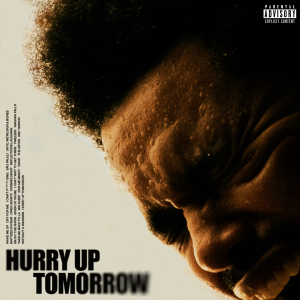By Staff Writer Angelina Chen
Abel Tesfaye, better known as The Weeknd, has never shied away from spectacle, and his newest album Hurry Up Tomorrow takes that impulse to the extreme. His sixth album — and potentially his last under The Weeknd moniker — is a sprawling odyssey that feels like a grand exit and a cautionary tale about the perils of fame. At nearly an hour and a half long, the album is as exhausting as it is impressive, blending influences from Brazilian funk, punishing house beats, and 70s soul into both a mesmerizing yet frustrating release.
From the opening moments of the second track “Cry For Me,” The Weeknd makes it clear that he’s still haunted by success. He sings of suffocating in luxury, a “penthouse prison,” essentially as a constant pressure to perform. If this lyrical element sounds familiar, it’s because it is, with similar references to fame appearing in past albums. Tesfaye has long explored the dark side of his celebrity status, but Hurry Up Tomorrow takes this obsession to an extreme — whether one considers them heights or pits.
While other artists in the pop genre, such as Billie Eilish and Olivia Rodrigo, have also sung of the life of the modern celebrity in a compelling manner, Tesfaye often stumbles, delivering lyrics that range from on-the-nose to downright cringeworthy. “You know it’s my opening night!” he pouts to a lover on “Opening Night,” sounding less tortured and more petulant in delivery. Tesfaye attempts to explore topics ranging from hedonistic excess to personal disillusionment, from synth-heavy excess to atmospheric ballads. While the album is wide-reaching in both style and subject matter, it does not have as evidently clear of a perspective as its predecessors like After Hours and Dawn FM, and the album’s conceptual unity suffers as a consequence.
But for all its lyrical missteps, Hurry Up Tomorrow is a sonic masterpiece. Tesfaye’s signature blend of dark R&B and electronic pop has evolved into something truly ambitious. Tracks like “São Paulo” and “Given Up on Me” are genre-blending experiments that shouldn’t work but do. The former, “São Paulo,” jumps from Brazilian funk to a relentless house beat, while the latter “Given Up on Me,” pieces together samples by American singer-songwriter Nina Simone, chopped-up piano chords, and warped 70s soul vocals into a hypnotic, yet fractured ballad. Even more straightforward songs shine, thanks to stunning production details: the ghostly English musician and singer-songwriter George Harrison-esque guitar on “Reflections Laughing,” the thick, rubbery bassline of “I Can’t Wait to Get There,” and the eerie, syrupy mix of synths and vintage backing vocals on “Big Sleep.”
As the album stretches toward its cinematic finale, Tesfaye embraces a thematic farewell narrative. The penultimate track “Without a Warning” swells with an end-credits grandeur, only to be interrupted by the sound of a screaming crowd demanding an encore. That encore arrives in the form of the title track, “Hurry Up Tomorrow,” a sweeping closing where Tesfaye declares, “I have no more fights left to win.” Serving his narrative, the line is both fitting and ambiguous, creating the illusion of closure while inviting the listener to question what fights Tesfaye confronts. Whether this album is truly his final act remains to be seen, but it certainly sounds like the curtain call he’s been building toward.
In the end, Hurry Up Tomorrow is an album at war with itself. While the music is brilliant, with unforgettable melodies and production that remains among the best of The Weeknd’s career, the lyrics leave more to be desired. The album is overall a testament to Tesfaye’s undeniable artistry, but also a reminder that he may have accomplished all that he set out to as The Weeknd, and may begin to retire his alter persona.



Be the first to comment on "The Weeknd’s Hurry Up Tomorrow Is A Sonic Triumph and Bittersweet Farewell"